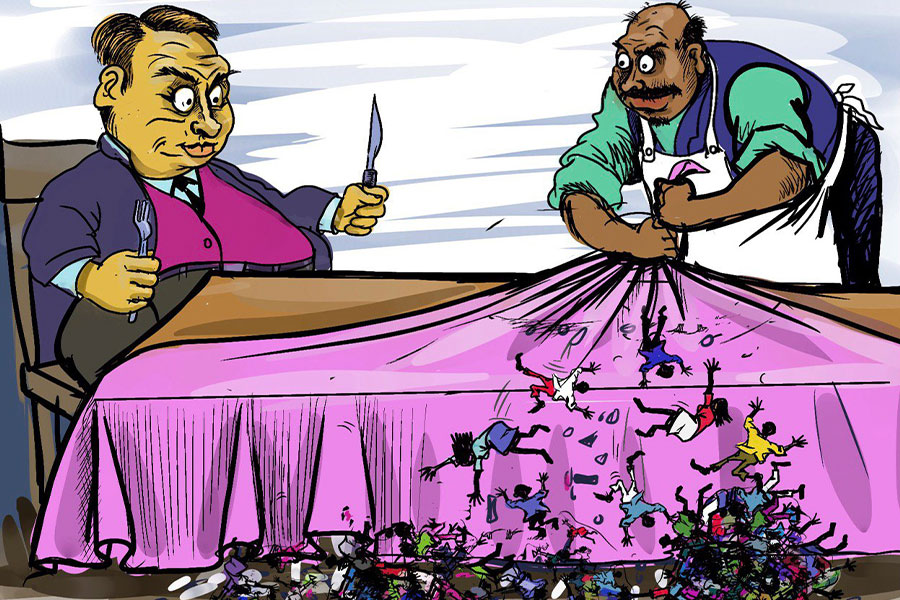
Jun 26 , 2021
By BERSABEH GEBRE ( FORTUNE STAFF WRITER )
A new directive governing the construction industry introduces a series of changes, with its authors convinced they have to battle unprofessionalism and growing risk in the sector. Leaders of the industry lobby group are not pleased with the changes in store for their industry.
Authorities regulating the industry believe the existing directive focuses mainly on machinery and equipment rather than the management and employees of the construction firms. The new directive significantly lowers the numbers of machinery contractors are required to own. More than 100 companies offer construction machinery rental services.
"Most construction companies are led by non-professionals, affecting the sector," Tewdros Tegege, head of the Construction Industry Reform Office, told Fortune.
Drafted by experts working for the Office under the Ministry of Urban Development & Construction (MoUDC), the directive seeks to limit the equity share a Chief Executive Officer (CEO) can have in a construction firm to no more than 20pc. It will also lower the capital requirement and narrow the grading system for contractors operating in an industry growing by an average of 15pc over a decade, higher than any other sector in the economy. The construction industry accounts for 21pc of the country's GDP, and remains one of the largest employers.
Tewodros Shimeles, CEO of TABU Construction Plc, in business for a decade, appreciated the changes, convinced that the limit on the ownership of construction firms will prevent just anybody from joining the sector.
"It'll professionalise the industry," he told Fortune.
The directive, set to be enforced next year, has scrapped the categories of grades eight to 10 and obligates the general managers of construction firms classified between grades two and seven to own no more than a fifth of the company's shares.
The directive also features new stipulations about the number of junior employees a contractor is obligated to hire, aiming to open job opportunities up to entry-level construction professionals.
Abebe Dinku (PhD), professor of civil engineering at the Addis Abeba University Institute of Technology, sees the rules about ownership somewhat positively but believes there are better alternatives out there. He cautions authorities the new directive might lead to disputes down the path. Abebe has urged the authorities to focus on performance-based enforcement that would offer general managers incentives and bonuses based on the companies` performance rather than shares.
The directive will also lower the annual turnover requirements for all but grade one construction companies active and entering the industry, expected to register over 350 million Br to get a license. A grade-two contractor was previously required to register a turnover of over 350 million Br, but that has now reduced by 50 million Br, while the requirements for grades three and four contractors lowered to 140 million Br and 70 million Br, respectively. The requirements for grade five and six contractors have more than halved to just 50 million Br and 20 million Br, correspondingly.
There is no financial requirement for grade seven contractors, requiring three civil engineers to get licensed.
Unlike some of the individuals in the industry, the Construction Contractors Association of Ethiopia opposes the changes made in the new directive. Its leaders argue that the changes in store do not consider the existing predicament of the industry and blame the officials for not allowing "sufficient discussions" with the industry leaders.
Girma Habtemariam, president of the Association, is concerned that a dearth of projects was suspended due to COVID-19, affecting contractors and left them out of work. He also objected to the new machinery and equipment quotas, claiming that this will discourage growth and foster dependency on rental companies.
Abdi Fekadu, CEO of Haverim Construction & General Contractor, operating since 2008, thinks that instead of lowering requirements on the number of machinery, the authorities should enable contractors to import the equipment duty-free.
PUBLISHED ON
Jun 26,2021 [ VOL
22 , NO
1104]

Editorial | Nov 25,2023

Fortune News | Sep 09,2023

Editorial | May 27,2023

Fortune News | Oct 13,2024

Commentaries | Sep 27,2025

Fortune News | Feb 12,2022

Editorial | May 31,2025

Viewpoints | Oct 30,2021

Commentaries | Apr 30,2021

Radar | May 09,2020

Dec 22 , 2024 . By TIZITA SHEWAFERAW
Charged with transforming colossal state-owned enterprises into modern and competitiv...

Aug 18 , 2024 . By AKSAH ITALO
Although predictable Yonas Zerihun's job in the ride-hailing service is not immune to...

Jul 28 , 2024 . By TIZITA SHEWAFERAW
Unhabitual, perhaps too many, Samuel Gebreyohannes, 38, used to occasionally enjoy a couple of beers at breakfast. However, he recently swit...

Jul 13 , 2024 . By AKSAH ITALO
Investors who rely on tractors, trucks, and field vehicles for commuting, transporting commodities, and f...

Oct 25 , 2025
The regulatory machinery is on overdrive. In only two years, no fewer than 35 new pro...

Oct 18 , 2025
The political establishment, notably the ruling party and its top brass, has become p...

Oct 11 , 2025
Ladislas Farago, a roving Associated Press (AP) correspondent, arrived in Ethiopia in...

Oct 4 , 2025
Eyob Tekalegn (PhD) had been in the Governor's chair for only weeks when, on Septembe...